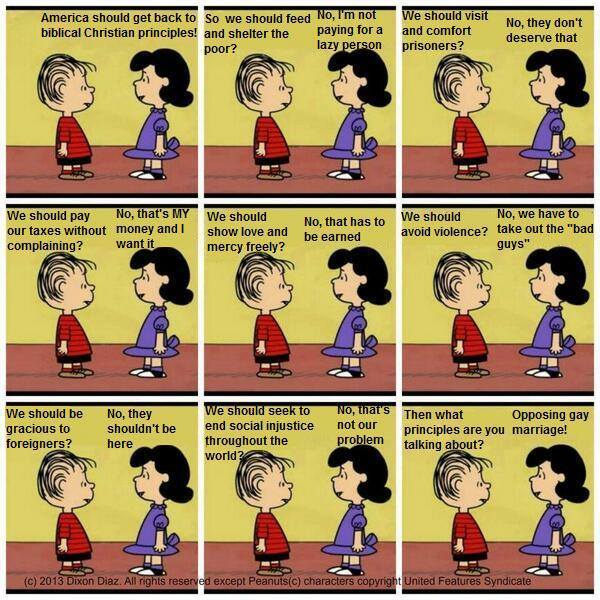“Inherit the Kingdom Prepared for You”
Matthew 25
LDS manual: here
Purpose
To encourage readers to develop their gifts of critical thinking, and avoid prejudice.
Reading
The reading this time is from Matthew, and Matthew alone. Usually there are some repeats in the other gospels, but not this time; Matthew’s the only one who records these things. Given Matthew’s propensity to make stuff up, this probably means that it’s a collection of stories that were around at the time, and not anything that Jesus might have said.
This lesson is brought to you by the number 10, because we’re treating these parables in this lesson:
- Parable of the ten virgins
- Parable of the ten talents
- Parable of the sheep and the goats (possibly ten of each)
Main ideas for this lesson
Parable of the ten virgins
This one doesn’t make a lot of sense at first.
Matthew 25:1 Then shall the kingdom of heaven be likened unto ten virgins, which took their lamps, and went forth to meet the bridegroom.
25:2 And five of them were wise, and five were foolish.
25:3 They that were foolish took their lamps, and took no oil with them:
25:4 But the wise took oil in their vessels with their lamps.
So what’s this story about? A bunch of slippery virgins? Are they all for the groom?
Not exactly. When you were part of the wedding party, you waited with a torch. If you didn’t have a torch, you might have been a wedding crasher. And those torches needed to be topped up with oil, or else they’d go out.
By the way, if you’re teaching this class in an actual Gospel Doctrine class, you’re meant to bring a container of oil, and when someone gives a suggestion, you’re supposed to add a droplet of oil to the container.
If you are using the jar and the oil or colored water (see the attention activity), explain that the jar represents the lamps in the parable. Put a drop of oil or water into the jar each time a class member suggests what we can do to prepare.
This is meant to teach class members that everything they do contributes only an insignificant amount to the oil level.
Alternatively, you can squirt class members with oil, and tell them it will heal them of their infirmities.
Matthew 25:5 While the bridegroom tarried, they all slumbered and slept.
25:6 And at midnight there was a cry made, Behold, the bridegroom cometh; go ye out to meet him.
25:7 Then all those virgins arose, and trimmed their lamps.
25:8 And the foolish said unto the wise, Give us of your oil; for our lamps are gone out.
25:9 But the wise answered, saying, Not so; lest there be not enough for us and you: but go ye rather to them that sell, and buy for yourselves.
I suppose sharing was out of the question.
Matthew 25:10 And while they went to buy, the bridegroom came; and they that were ready went in with him to the marriage: and the door was shut.
25:11 Afterward came also the other virgins, saying, Lord, Lord, open to us.
25:12 But he answered and said, Verily I say unto you, I know you not.
25:13 Watch therefore, for ye know neither the day nor the hour wherein the Son of man cometh.
While I was on my mission, I had an investigator ask, “Does everyone who gets baptised stay active?” I told him, no, some don’t.
“Well, what percentage stays active?” he asked.
At the time, it seemed to me to run about half and half, so that’s what I said. And for justification, I made a rather deft (I thought at the time) link to the Parable of the Ten Virgins. Five out of the ten were ready, five weren’t; there you go, fifty percent. Isn’t it great how you can find a scriptural justification for a figure you just pulled out of your ass?
What I didn’t know was that the facts were much worse: As mentioned in an earlier lesson, only about a third of Latter-day Saints are active, according to the church’s information expert.
What if The Church of Jesus Christ of Latter-day Saints were a congregation of just 100 people? This is what Blaine Maxfield, chief information officer of The Church of Jesus Christ of Latter-day Saints and managing director of the church’s IT department, invited attendees of the LDSTech Conference to imagine Thursday morning at the University of Utah.
Other notable statistics included:
- 35 are adult males
- 42 are adult females
- 13 are in Primary
- 10 are youths
- 36 attend sacrament meeting on a weekly basis
- five can’t read or write
Wait, what?
We’re not supposed to know this, of course. The information was quickly redacted in the Deseret News article, but saved on the Net.
Isn’t this a bit of a giveaway that even members don’t really find meetings worthwhile? Members frequently talk about all the good things the church does for them, but it doesn’t look like it here. If the church really improved people’s lives, you wouldn’t be able to keep people out! Instead, you have to patiently coax them into baptism, and then you have to run around after them to keep them active. If the church were true or practical or useful, it would be more obviously so.
Of course, just like in the parable, the virgins get the blame; they don’t make it because they’re not prepared. But in real life, people don’t keep going to church because it’s a rather tedious and unpleasant waste of time where you’re made to feel bad about yourself. And you’re supporting a hate group that works tirelessly to deny rights to people. Plus the fact that it isn’t actually… you know… true. There are some very good reasons to stop participating in the LDS Church, and they have nothing to do with oil.
Parable of the talents
So, just a bit of context. Jesus is expanding on his earlier parable, where he explains that he gives to give more to people who have done well for themselves — and by the way, if someone doesn’t want him to be king, then he’s going to kill them.
Luke 19:26 For I say unto you, That unto every one which hath shall be given; and from him that hath not, even that he hath shall be taken away from him.
19:27 But those mine enemies, which would not that I should reign over them, bring hither, and slay them before me.
Jesus hasn’t changed. He’s still the maniac he was in the Old Testament.
Matthew 25:14 For the kingdom of heaven is as a man travelling into a far country, who called his own servants, and delivered unto them his goods.
25:15 And unto one he gave five talents, to another two, and to another one; to every man according to his several ability; and straightway took his journey.
25:16 Then he that had received the five talents went and traded with the same, and made them other five talents.
25:17 And likewise he that had received two, he also gained other two.
25:18 But he that had received one went and digged in the earth, and hid his lord’s money.
25:19 After a long time the lord of those servants cometh, and reckoneth with them.
25:20 And so he that had received five talents came and brought other five talents, saying, Lord, thou deliveredst unto me five talents: behold, I have gained beside them five talents more.
25:21 His lord said unto him, Well done, thou good and faithful servant: thou hast been faithful over a few things, I will make thee ruler over many things: enter thou into the joy of thy lord.
25:22 He also that had received two talents came and said, Lord, thou deliveredst unto me two talents: behold, I have gained two other talents beside them.
25:23 His lord said unto him, Well done, good and faithful servant; thou hast been faithful over a few things, I will make thee ruler over many things: enter thou into the joy of thy lord.
Capitalism FTW!
Side note: One of my Russian professors at BYU was making a defence of socialism in class — hypothetical, mind you! — and told us that none of the parables of Jesus ever advanced capitalism. I responded with the Parable of the Ten Talents. He reflected, and retracted the claim. Fun at BYU.
Matthew 25:24 Then he which had received the one talent came and said, Lord, I knew thee that thou art an hard man, reaping where thou hast not sown, and gathering where thou hast not strawed:
25:25 And I was afraid, and went and hid thy talent in the earth: lo, there thou hast that is thine.
Maybe he was afraid of getting killed, because he’d heard about the previous version of this parable. Just saying.
25:26 His lord answered and said unto him, Thou wicked and slothful servant, thou knewest that I reap where I sowed not, and gather where I have not strawed:
25:27 Thou oughtest therefore to have put my money to the exchangers, and then at my coming I should have received mine own with usury.
25:28 Take therefore the talent from him, and give it unto him which hath ten talents.
25:29 For unto every one that hath shall be given, and he shall have abundance: but from him that hath not shall be taken away even that which he hath.
25:30 And cast ye the unprofitable servant into outer darkness: there shall be weeping and gnashing of teeth.
The LDS manual has a teaching idea.
Give each class member a pen or pencil and a piece of paper. Ask them to write down one or two of their talents or gifts along with at least one specific thing they will do in the next few weeks to use them in the service of others.
Ask: What will God do to you if you do not increase your talents?
Answer: Cast you into outer darkness, apparently.
Maybe it’s worth asking, though. What talents do you have? Which ones kept you in the church for so long, and which ones got you out? For me, my patience, tolerance for ambiguity, and my sense of social cohesion kept me in for far longer than they should have.
It’s fairly common for ex-Mormons to beat themselves up a bit, post-deconversion. How could I have been fooled for so long? How did I not see the con? Why did I stay in for so long? But we all had our reasons, and in some cases, these reasons were brought on by the good things about us. We should value them. They made us what we are today, even if they once had less-than-salubrious effects. And we should also value the things that got us out, including critical thinking, skepticism, willingness to laugh at those who take themselves too seriously, and regard for our own way of thinking over what others will think. (We might have learned some of these things in church, too.)
Parable of the sheep and the goats
I admit that goats are weird and creepy.
But are they so terrible that Jesus had to make a parable with them as a villain?
Matthew 25:31 When the Son of man shall come in his glory, and all the holy angels with him, then shall he sit upon the throne of his glory:
25:32 And before him shall be gathered all nations: and he shall separate them one from another, as a shepherd divideth his sheep from the goats:
25:33 And he shall set the sheep on his right hand, but the goats on the left.
Wow. What happens to the goats?
Matthew 25:41 Then shall he say also unto them on the left hand, Depart from me, ye cursed, into everlasting fire, prepared for the devil and his angels:
This is just another reference Jesus made to sending people into everlasting fire.
Let’s just take a moment and reflect on a group of people who have been the targets of prejudice in times past. While things have improved for them, they are still sometimes misunderstood even today. I’m talking about… the left-handed.
The Bible pretty consistently favours right-handers over left.
Ecclesastes 10:2 (King James Version)
A wise man’s heart is at his right hand; but a fool’s heart at his left.
When does the Bible talk about how great someone’s left hand is? Never. Left-handers were considered “sinister” — the word sinister even means ‘left-handed’. Just one more form of prejudice that the Bible writers found acceptable.
Ye have done it unto me
Okay, now for a change of pace. You know that I spend a lot of effort bashing away at the Standard Works. I do this because, frankly, they’re terrible and they teach bad things. They don’t deserve their reputation for teaching kindness and decency.
On the other hand, I have to give credit where credit is due, and here’s one of the best scriptures in the lot.
Matthew 25:34 Then shall the King say unto them on his right hand, Come, ye blessed of my Father, inherit the kingdom prepared for you from the foundation of the world:
25:35 For I was an hungred, and ye gave me meat: I was thirsty, and ye gave me drink: I was a stranger, and ye took me in:
25:36 Naked, and ye clothed me: I was sick, and ye visited me: I was in prison, and ye came unto me.
25:37 Then shall the righteous answer him, saying, Lord, when saw we thee an hungred, and fed thee? or thirsty, and gave thee drink?
25:38 When saw we thee a stranger, and took thee in? or naked, and clothed thee?
25:39 Or when saw we thee sick, or in prison, and came unto thee?
25:40 And the King shall answer and say unto them, Verily I say unto you, Inasmuch as ye have done it unto one of the least of these my brethren, ye have done it unto me.
A message missed by those who worship Republican Jesus.
Stephen Colbert perhaps said it best.
It’s great that Jesus encouraged love and generosity. On the other hand, it seems hypocritical of Jesus to teach love and generosity, and then in the very next verse threaten people with eternal torture in fire. (I might say: If Jesus tortures even one of the least of my brethren in fire for eternity, he has done it unto me.) But then this inconsistency is to be expected in a completely made-up story cobbled together over hundreds of years. Thank goodness it’s all a myth.
Let’s finish with a closing hymn. See you next week.





Recent Comments